Social Marketing Strategies to Encourage Breastfeeding (University)
VerifiedAdded on 2021/05/31
|5
|798
|55
Essay
AI Summary
This essay examines the application of social marketing principles to promote breastfeeding among young mothers. It explores the use of Cialdini's fixed action techniques, analyzing their benefits and limitations in encouraging breastfeeding practices. The essay delves into the influence of social norms, social support, and public health initiatives in overcoming obstacles to breastfeeding. It discusses the importance of peer-led discourses, demonstrations, and interpersonal discussions. Furthermore, it evaluates the effectiveness of techniques like leveraging and authority, considering how these can be optimized to improve breastfeeding rates. The essay also references several research papers to support its arguments.
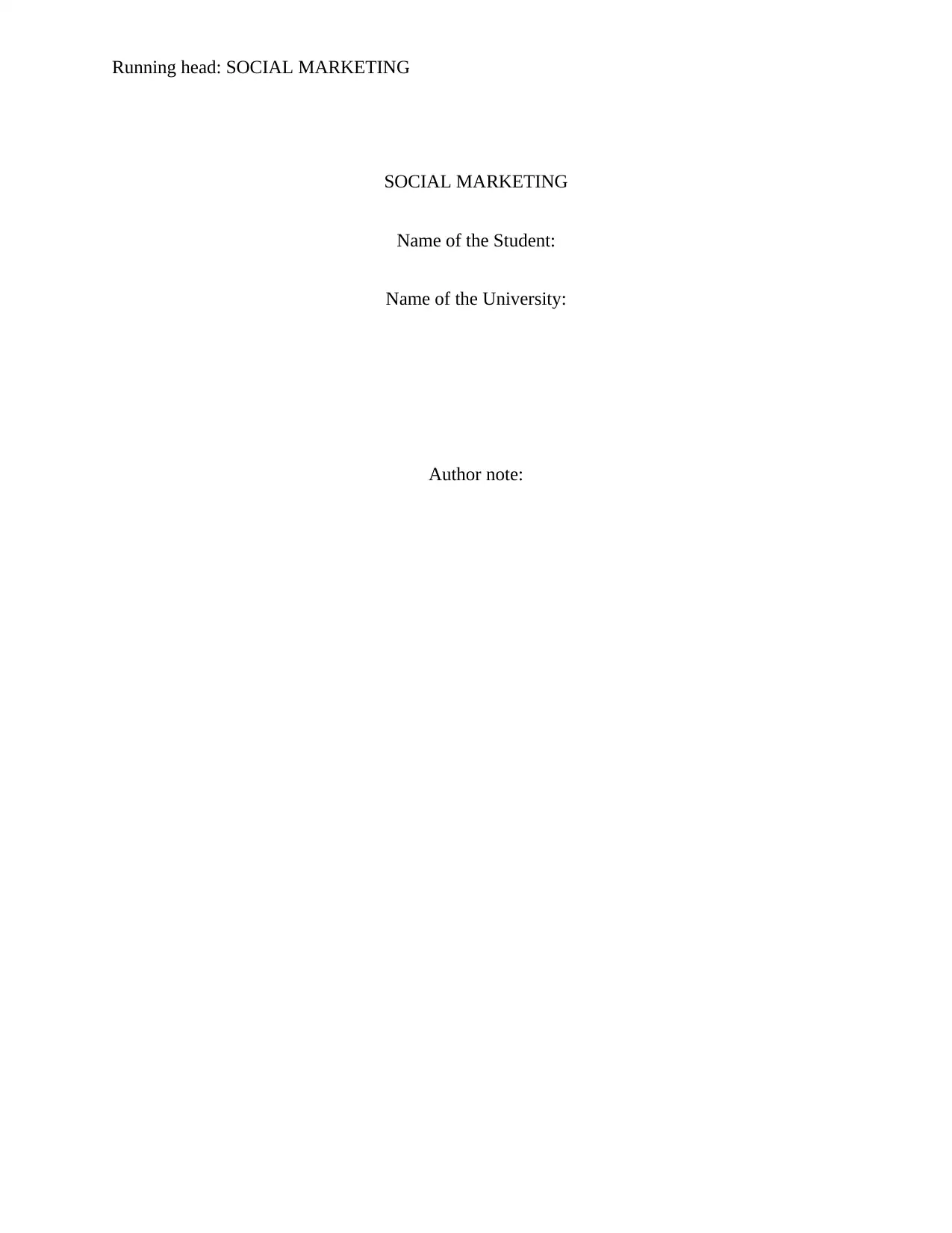
Running head: SOCIAL MARKETING
SOCIAL MARKETING
Name of the Student:
Name of the University:
Author note:
SOCIAL MARKETING
Name of the Student:
Name of the University:
Author note:
Paraphrase This Document
Need a fresh take? Get an instant paraphrase of this document with our AI Paraphraser
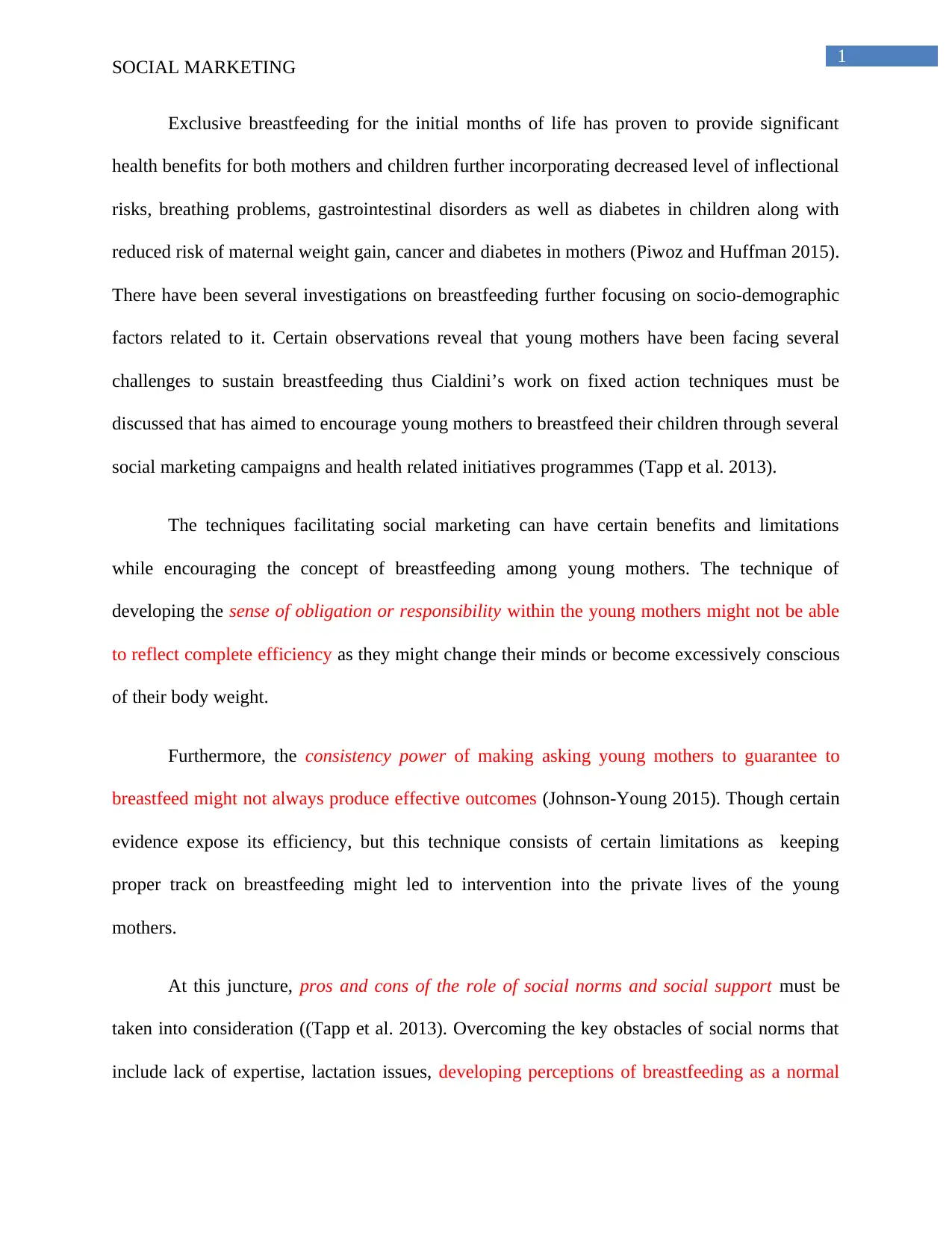
1
SOCIAL MARKETING
Exclusive breastfeeding for the initial months of life has proven to provide significant
health benefits for both mothers and children further incorporating decreased level of inflectional
risks, breathing problems, gastrointestinal disorders as well as diabetes in children along with
reduced risk of maternal weight gain, cancer and diabetes in mothers (Piwoz and Huffman 2015).
There have been several investigations on breastfeeding further focusing on socio-demographic
factors related to it. Certain observations reveal that young mothers have been facing several
challenges to sustain breastfeeding thus Cialdini’s work on fixed action techniques must be
discussed that has aimed to encourage young mothers to breastfeed their children through several
social marketing campaigns and health related initiatives programmes (Tapp et al. 2013).
The techniques facilitating social marketing can have certain benefits and limitations
while encouraging the concept of breastfeeding among young mothers. The technique of
developing the sense of obligation or responsibility within the young mothers might not be able
to reflect complete efficiency as they might change their minds or become excessively conscious
of their body weight.
Furthermore, the consistency power of making asking young mothers to guarantee to
breastfeed might not always produce effective outcomes (Johnson-Young 2015). Though certain
evidence expose its efficiency, but this technique consists of certain limitations as keeping
proper track on breastfeeding might led to intervention into the private lives of the young
mothers.
At this juncture, pros and cons of the role of social norms and social support must be
taken into consideration ((Tapp et al. 2013). Overcoming the key obstacles of social norms that
include lack of expertise, lactation issues, developing perceptions of breastfeeding as a normal
SOCIAL MARKETING
Exclusive breastfeeding for the initial months of life has proven to provide significant
health benefits for both mothers and children further incorporating decreased level of inflectional
risks, breathing problems, gastrointestinal disorders as well as diabetes in children along with
reduced risk of maternal weight gain, cancer and diabetes in mothers (Piwoz and Huffman 2015).
There have been several investigations on breastfeeding further focusing on socio-demographic
factors related to it. Certain observations reveal that young mothers have been facing several
challenges to sustain breastfeeding thus Cialdini’s work on fixed action techniques must be
discussed that has aimed to encourage young mothers to breastfeed their children through several
social marketing campaigns and health related initiatives programmes (Tapp et al. 2013).
The techniques facilitating social marketing can have certain benefits and limitations
while encouraging the concept of breastfeeding among young mothers. The technique of
developing the sense of obligation or responsibility within the young mothers might not be able
to reflect complete efficiency as they might change their minds or become excessively conscious
of their body weight.
Furthermore, the consistency power of making asking young mothers to guarantee to
breastfeed might not always produce effective outcomes (Johnson-Young 2015). Though certain
evidence expose its efficiency, but this technique consists of certain limitations as keeping
proper track on breastfeeding might led to intervention into the private lives of the young
mothers.
At this juncture, pros and cons of the role of social norms and social support must be
taken into consideration ((Tapp et al. 2013). Overcoming the key obstacles of social norms that
include lack of expertise, lactation issues, developing perceptions of breastfeeding as a normal
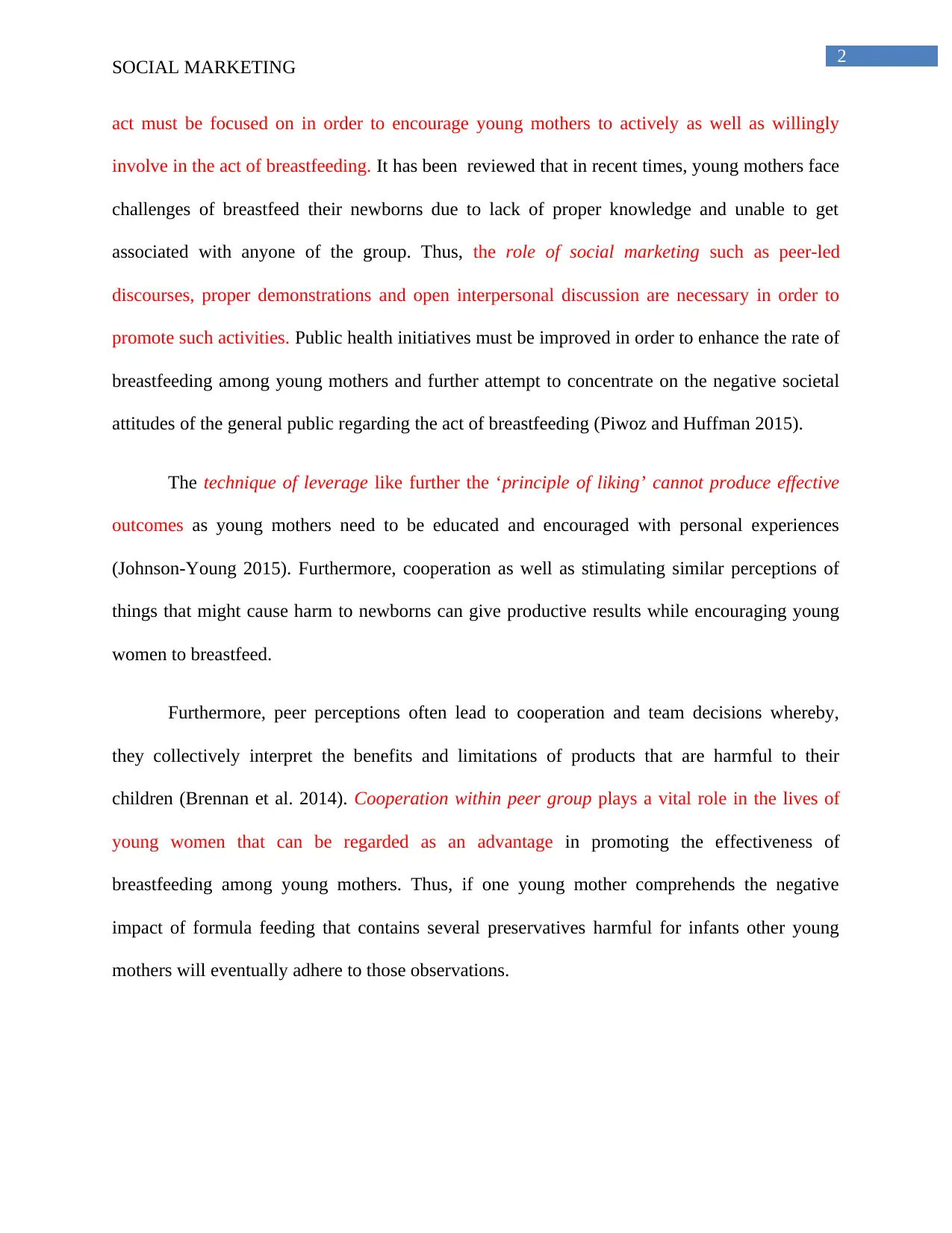
2
SOCIAL MARKETING
act must be focused on in order to encourage young mothers to actively as well as willingly
involve in the act of breastfeeding. It has been reviewed that in recent times, young mothers face
challenges of breastfeed their newborns due to lack of proper knowledge and unable to get
associated with anyone of the group. Thus, the role of social marketing such as peer-led
discourses, proper demonstrations and open interpersonal discussion are necessary in order to
promote such activities. Public health initiatives must be improved in order to enhance the rate of
breastfeeding among young mothers and further attempt to concentrate on the negative societal
attitudes of the general public regarding the act of breastfeeding (Piwoz and Huffman 2015).
The technique of leverage like further the ‘principle of liking’ cannot produce effective
outcomes as young mothers need to be educated and encouraged with personal experiences
(Johnson-Young 2015). Furthermore, cooperation as well as stimulating similar perceptions of
things that might cause harm to newborns can give productive results while encouraging young
women to breastfeed.
Furthermore, peer perceptions often lead to cooperation and team decisions whereby,
they collectively interpret the benefits and limitations of products that are harmful to their
children (Brennan et al. 2014). Cooperation within peer group plays a vital role in the lives of
young women that can be regarded as an advantage in promoting the effectiveness of
breastfeeding among young mothers. Thus, if one young mother comprehends the negative
impact of formula feeding that contains several preservatives harmful for infants other young
mothers will eventually adhere to those observations.
SOCIAL MARKETING
act must be focused on in order to encourage young mothers to actively as well as willingly
involve in the act of breastfeeding. It has been reviewed that in recent times, young mothers face
challenges of breastfeed their newborns due to lack of proper knowledge and unable to get
associated with anyone of the group. Thus, the role of social marketing such as peer-led
discourses, proper demonstrations and open interpersonal discussion are necessary in order to
promote such activities. Public health initiatives must be improved in order to enhance the rate of
breastfeeding among young mothers and further attempt to concentrate on the negative societal
attitudes of the general public regarding the act of breastfeeding (Piwoz and Huffman 2015).
The technique of leverage like further the ‘principle of liking’ cannot produce effective
outcomes as young mothers need to be educated and encouraged with personal experiences
(Johnson-Young 2015). Furthermore, cooperation as well as stimulating similar perceptions of
things that might cause harm to newborns can give productive results while encouraging young
women to breastfeed.
Furthermore, peer perceptions often lead to cooperation and team decisions whereby,
they collectively interpret the benefits and limitations of products that are harmful to their
children (Brennan et al. 2014). Cooperation within peer group plays a vital role in the lives of
young women that can be regarded as an advantage in promoting the effectiveness of
breastfeeding among young mothers. Thus, if one young mother comprehends the negative
impact of formula feeding that contains several preservatives harmful for infants other young
mothers will eventually adhere to those observations.
⊘ This is a preview!⊘
Do you want full access?
Subscribe today to unlock all pages.

Trusted by 1+ million students worldwide
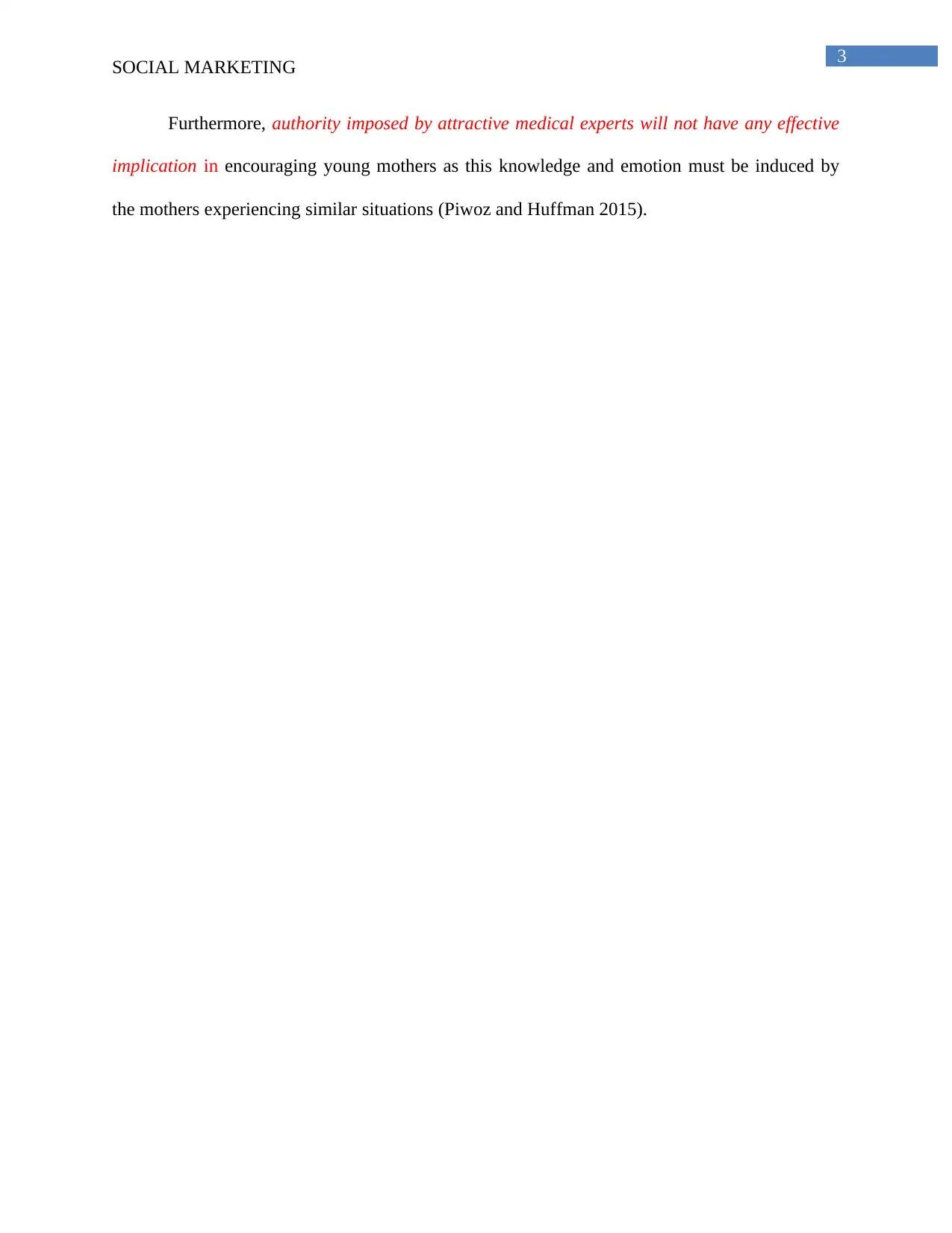
3
SOCIAL MARKETING
Furthermore, authority imposed by attractive medical experts will not have any effective
implication in encouraging young mothers as this knowledge and emotion must be induced by
the mothers experiencing similar situations (Piwoz and Huffman 2015).
SOCIAL MARKETING
Furthermore, authority imposed by attractive medical experts will not have any effective
implication in encouraging young mothers as this knowledge and emotion must be induced by
the mothers experiencing similar situations (Piwoz and Huffman 2015).
Paraphrase This Document
Need a fresh take? Get an instant paraphrase of this document with our AI Paraphraser
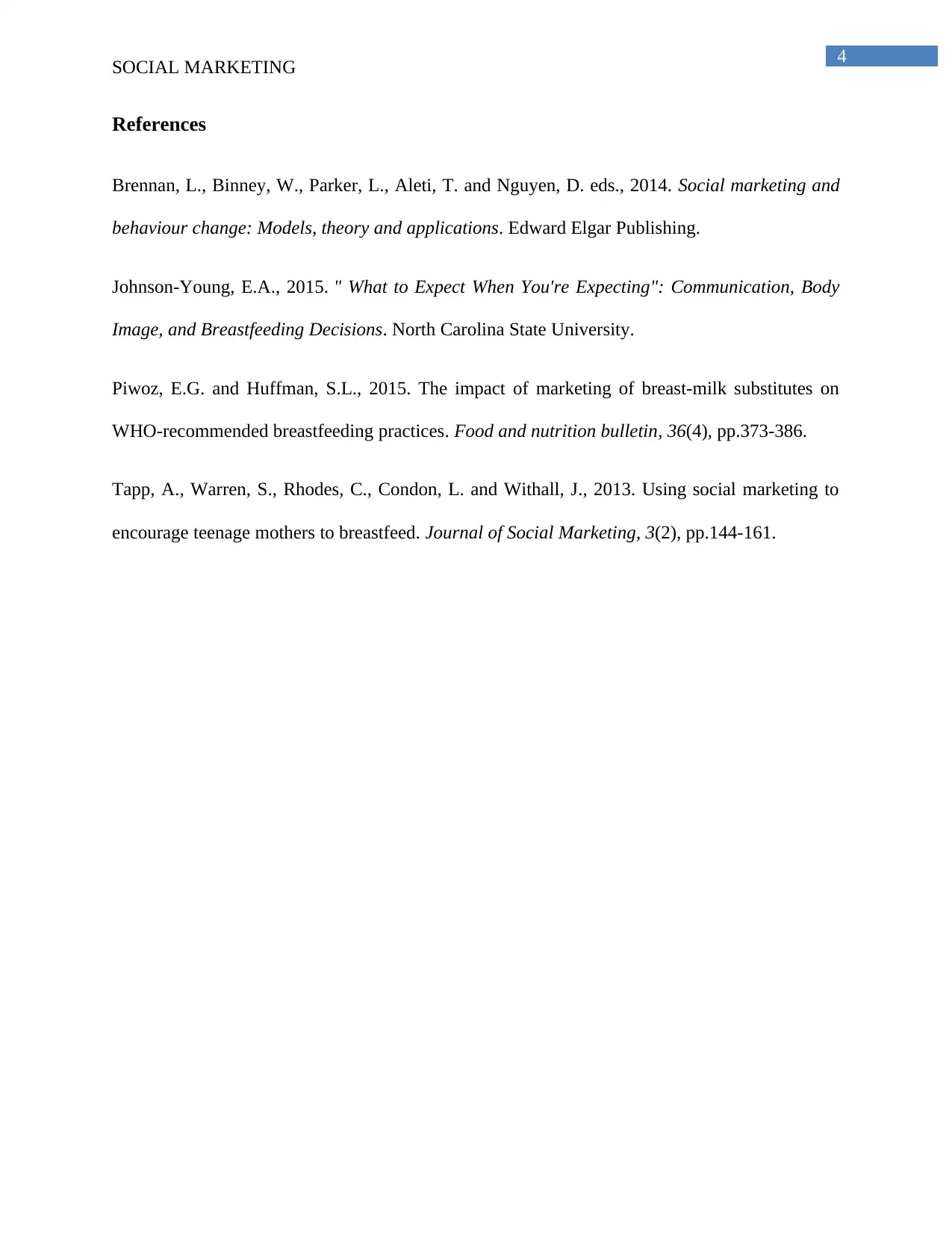
4
SOCIAL MARKETING
References
Brennan, L., Binney, W., Parker, L., Aleti, T. and Nguyen, D. eds., 2014. Social marketing and
behaviour change: Models, theory and applications. Edward Elgar Publishing.
Johnson-Young, E.A., 2015. " What to Expect When You're Expecting": Communication, Body
Image, and Breastfeeding Decisions. North Carolina State University.
Piwoz, E.G. and Huffman, S.L., 2015. The impact of marketing of breast-milk substitutes on
WHO-recommended breastfeeding practices. Food and nutrition bulletin, 36(4), pp.373-386.
Tapp, A., Warren, S., Rhodes, C., Condon, L. and Withall, J., 2013. Using social marketing to
encourage teenage mothers to breastfeed. Journal of Social Marketing, 3(2), pp.144-161.
SOCIAL MARKETING
References
Brennan, L., Binney, W., Parker, L., Aleti, T. and Nguyen, D. eds., 2014. Social marketing and
behaviour change: Models, theory and applications. Edward Elgar Publishing.
Johnson-Young, E.A., 2015. " What to Expect When You're Expecting": Communication, Body
Image, and Breastfeeding Decisions. North Carolina State University.
Piwoz, E.G. and Huffman, S.L., 2015. The impact of marketing of breast-milk substitutes on
WHO-recommended breastfeeding practices. Food and nutrition bulletin, 36(4), pp.373-386.
Tapp, A., Warren, S., Rhodes, C., Condon, L. and Withall, J., 2013. Using social marketing to
encourage teenage mothers to breastfeed. Journal of Social Marketing, 3(2), pp.144-161.
1 out of 5
Your All-in-One AI-Powered Toolkit for Academic Success.
+13062052269
info@desklib.com
Available 24*7 on WhatsApp / Email
![[object Object]](/_next/static/media/star-bottom.7253800d.svg)
Unlock your academic potential
Copyright © 2020–2025 A2Z Services. All Rights Reserved. Developed and managed by ZUCOL.